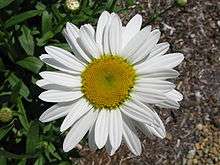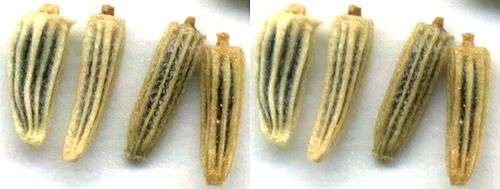Leucanthemum × superbum
Leucanthemum × superbum, the Shasta daisy, is a commonly grown[1] flowering herbaceous perennial plant with the classic daisy appearance of white petals (ray florets) around a yellow disc, similar to the oxeye daisy Leucanthemum vulgare Lam, but larger.
| Leucanthemum × superbum | |
|---|---|
 | |
| Flower of the cultivar 'Becky' | |
| Scientific classification | |
| Kingdom: | Plantae |
| Clade: | Tracheophytes |
| Clade: | Angiosperms |
| Clade: | Eudicots |
| Clade: | Asterids |
| Order: | Asterales |
| Family: | Asteraceae |
| Genus: | Leucanthemum |
| Species: | L. × superbum |
| Binomial name | |
| Leucanthemum × superbum (Bergmans ex J.W.Ingram) D.H.Kent | |
| ||
| ||
| ||
| ||
| ||
| Shasta Daisy seeds |
It originated as a hybrid produced in 1890 by the American horticulturist Luther Burbank from a number of daisies. First, he crossed Leucanthemum vulgare with Leucanthemum maximum (Ramond) DC.; this double hybrid was itself crossed with Leucanthemum lacustre (Brot.) Samp.[2][3] The resulting Leucanthemum triple hybrid was crossed with Nipponanthemum nipponicum (Franch. ex Maxim.) Kitam., creating an intergeneric cross of species from three continents.[2][3] It was named after Mount Shasta, because its petals were the color of the snow. Some members of the genus are considered noxious weeds, but the Shasta daisy remains a favorite garden plant.
Many cultivars are suitable for cut flowers, such as 'Becky', 'Esther Read', 'Silberprinzesschen' (Silver Princess), 'Snow Lady', 'Tinkerbell', 'Wirral Pride', 'Wirral Supreme'. The cultivar 'T.E. Killin'[4] has gained the Royal Horticultural Society's Award of Garden Merit.[5]
References
- "Leucanthemum × superbum (Shasta daisy)". Gardenia. Retrieved 23 November 2019.
- Ruth Rogers Clausen and Thomas Christopher. Essential Perennials: The Complete Reference to 2700 Perennials for the Home Garden. Timber Press, 2015. p. 250. ISBN 9781604696721
- Maureen Gilmer. "Discovering a Daisy". The Daily Journal. 15 August 2014. Retrieved 15 April 2015.
- "RHS Plant Selector - Leucanthemum × superbum 'T.E. Killin'". Retrieved 14 July 2013.
- "AGM Plants - Ornamental" (PDF). Royal Horticultural Society. July 2017. p. 59. Retrieved 21 March 2018.
External links
- "Shasta Daisy" at Luther Burbank Home & Gardens website
| Wikimedia Commons has media related to Leucanthemum superbum. |
